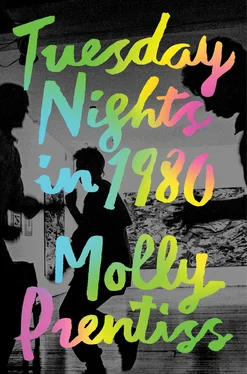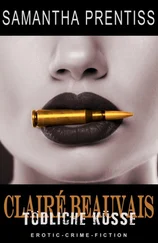THREE: BLUE/GRACE
High school was the beginning of his blue period. James was all acne, ears, and quadratic equations. Once he stepped through the doors of Old Forge High, his whole scope of vision was taken up by a pale, grisly blue. The green chalkboards were blue; the hair of the other kids was blue; the grass where the cheerleaders practiced was blue. This made him incredibly depressed and difficult to relate to; the other kids, he knew, saw high school as a new and exciting rainbow. When, out of nowhere, Rachel Renolds, the generously endowed junior prom queen, singled him out in the hall to see if he wanted to join the Literary Lowlifes, the club she was starting so she could have something to put on her college applications, and James, stunned, nodded enthusiastically, the following conversation went something like this:
Rachel: “Hahahahahahaha!”
James: “What?”
Rachel: “You think there’s actually a club called the Literary Lowlifes?”
James: “I don’t see why there couldn’t be.”
Rachel: “Hahahahaha! That’s the point. You are a lowlife, so of course you’d think it’s real.”
James: “Your hair.”
Rachel: “What about my hair?”
James: “It’s glaucous.”
Rachel: “What on earth are you taking about, you freak?”
James: “It’s a kind of blue.”
Rachel: “You’re simply the Worst. Nerd. In. The. School.”
The saving grace? Grace. A girl with long, silky dark hair, who, overhearing this terrible conversation, pulled James away and hid him behind the shield of her locker door.
“Rachel’s a vacuous cunt,” she said, surprising James to the point of breathlessness with each of those words. Vacuous meant she had a brain, and cunt meant she had an edge, two things that James coveted immediately. Even though she was popular, Grace ate lunch with him in the glasses-and-suspenders section of the quad that day, and for the rest of the year, and they maintained the kind of coed friendship where the male’s unrequited romantic interest in the female was both blatant and unimportant; all that mattered was that they were around each other . And because Grace’s father was a college professor, and because she asked him to come along when her father let her sit in on one of his night classes (Intro to Composition at U Penn), James discovered college.
Even more than the subject matter (they were doing a lesson on visual analysis, during which the professor asked the class to “have an intellectual argument with an image”), it was the sensation of that class that captivated James — the burgundy, regal feeling of the room, the round globes outside the windows that lit the pathways to the dormitories, the books the students spread dutifully on the desks. Driving home that night in the backseat of Grace’s father’s smooth, black car, James felt a new hope.
“I loved it,” he whispered to Grace in the back of the car.
“I know,” she whispered back, and she kissed the tip of his nose.
There was a place for him on this earth, he knew then. A place where learning was paramount and strange viewpoints were encouraged; a place where one’s worth was measured by their ideas rather than height (or ear size); a place where parents didn’t putter and pout and drink until one of them hit the other one, where showers and meals were communal, where brunette women wore their hair short, where good boys were made into great men, where golden lights lit pathways to the truth, and where acceptance happened before you even arrived… and that place was college.
FOUR: SEX/GENIUS
In college, James discovered art and sex. His first semester at Columbia, while in line for overcooked pasta at the student cafeteria, he spotted a girl whose red hair made his bladder tingle the way Grace’s green eyes had, and whose face — perhaps due to the tense wrinkle in her forehead — looked like the most intelligent face he’d ever seen. Too embarrassed to talk to her while eating soggy noodles, he waited until they finished lunch and followed her out into the quad, and then across the quad, and then into a dark lecture hall.
The room was filled with students of a different breed than he had in his classes, as he was a history major, and this — he found out as a vibrant slide show erupted from a projector onto the front wall of the room — was an art class. A graduate art class, he discovered from the header on the leaflet that was handed out, titled Marc Chagall’s Nostalgia . As the angular, colorful, nostalgic images flashed across the back wall, James felt the same tingling in his groin he had felt in the spaghetti line; Chagall had literally given him a hard-on. The redhead, who he had stupidly chosen to sit next to, giggled when she looked over at his bulging pants when the lights came on. But then, to his great surprise, she grabbed his hand and led him back through the evening air to her dorm room, where she pulled down his pants and finished him off. It was not until after this glorious, completely novel experience that James noticed that her roommate was in attendance, listening to James’s first gasp of female-induced pleasure when he finally came.
He never saw the redheaded graduate student again, but he did see Chagall, in the art classes he signed up for every semester thereafter. Eventually his counselor told him he’d have to switch majors if he wanted to keep avoiding his history requirements, so he did — to art history — and never looked back. In a course titled Paradox: Embracing the Postmodern Paradigm he discovered Duchamp toilets, mysterious “happenings,” and art as essence rather than object. In John Cage’s four minutes and thirty-three seconds of silence, played during the seminar by an animated professor with Einsteinian hair, James saw the exact same speckled light he saw when listening to classical music, and tasted, quite distinctly, black pepper, which even made him sneeze. Here it was, he thought while sitting in the bright, silent room, the collisions that happened in his own brain, bursting out before him like explosions.
He called Grace from his dorm room.
“I found out what I need to do!” he blurted, unable to contain his excitement.
“And what’s that, dear James?” Grace said. She had taken on a motherly quality since they’d parted after high school, and was prone to using words like dear and darling.
“I need to make art, ” James said, his mind flying.
Grace was smiling on the other end of the phone. James could hear it.
He explained to Grace what he had discovered in Painting 2B, that Kandinsky had synesthesia, and, as he had found out in English 1A, so did Nabokov — he could see colors in letters just as James did! — and they were geniuses of metaphor and color and ideas!
“You’ll be great,” Grace said, and James thought: Grace is never wrong.
So invigorated by the possibility of being or becoming a genius, James then plunged into art like it was the blue lake of the letter O , hardly ever rising for air.
FIVE: BAD ART/GOOD KISS
Despite fervent passion and excessive diligence, James couldn’t make good art. He couldn’t seem to re-create what was happening in his mind with his hands; his paintings were muddy, his sculptures made no sense, and his teachers cocked their heads during his critiques in a way that suggested confusion as to why he was here in the first place. But James didn’t need their opinions to know: the art was not inside him. He loved looking at art. He loved thinking about art. But this love didn’t come out of his hands — it came out of his mind.
Читать дальше












